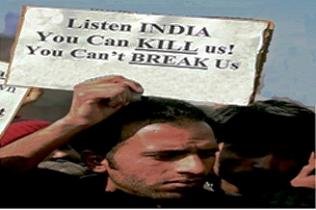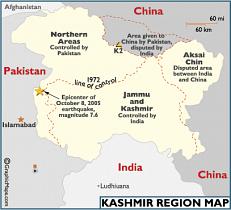Kashmiris Ask: Why is U.N Shutting Eyes?
United Nations Human Rights Chief Ms Pillay, on December 11, 2011, said "World body is ‘watching and monitoring’ the human rights situation in Kashmir" and added that so far there have been ´no calls´ for a full-fledged commission of inquiry. "My office focuses on Kashmir and the violations there. We have had a number of exchanges of correspondence." Asked whether the inquiry could be conducted on the lines of Syria, Ms Pillay said that for the UN to order a ‘commission of inquiry’ in Kashmir, consent of the government concerned is required to ´let you in´. “We can do investigations (in Kashmir) as we have done in Syria by interviewing people outside the country but for a proper investigation, obviously, we would need to be inside the country," she said.
Kudos to Ms Pillay who implied in fair and square terms the inability of UN forums to persuade India to allow the outside world to see the crimes committed on such a large scale. Two million people in mid-nineties marched to United Nations Office at Gupkar, in the capital city Srinagar, Kashmir and handed over tons of material to impress upon UN not to shut its eyes to stark realities and pleaded to rescue them from subjugation using brute force by the occupational army. UN was also reminded of various UN Security Council Resolutions on Kashmir yet to be implemented. India has always been a stumbling block to solve the issue even though the international community, time and again, pleaded for its early resolution.
It touches India´s sensitive nerve when a member of United Nations mentions the need for a Resolution of Kashmir to maintain peace in the world and to cite an example UK´s erstwhile Foreign Secretary, Mr. Robin Cook answered a question in Calcutta saying that India and Pakistan should resolve Kashmir but it is important that the wish of the people of Kashmir is taken into consideration. That time India’s Prime Minister I K Gujral who was on a State visit to Durban, South Africa stated, perhaps out of frustration, that "Britain was a third-rate power".
Omar Abdullah, the imposed ´Chief Minister´ of Kashmir, on January 03, 2012 termed the killing of a young man Altaf by Indian army in Baramulla, Kashmir as "inexcusable, excessive use of force". The boy was gunned down as he was part of the mob protesting against the continuous power shortage especially when people have to live and brave condition of sub-zero temperatures. Kashmir produces enough hydro power stolen and transmitted to India’s ´NATIONAL GRID´ that suffices the electricity need of a major area of north India.
IANS from India’s capital reports (Jan 03, 2012) that "all-women terror outfit of 21 girls" from Pakistan Administrated Kashmir is readied to infiltrate. The ´news´ a brainchild and a figment of imagination of notorious Indian intelligence agency RAW (Research and Analysis Wing) responsible for most of the atrocities on hapless populace; is trying to cover up the rapes and killing of hundreds of Kashmiri women and at the same time creates a pretext and justification for such future crimes. It is not difficult to comprehend that Indian Army Chief Gen V K Singh opposes the withdrawal of draconian ´Armed Forces Special Powers Act´ (AFSPA) saying "this could result in ´emergence of terror sanctuaries and safe havens". The army chief takes liberties to hoodwink the world bodies by saying that "Kashmir is affected by Pakistan sponsored proxy war". Though Kashmir has been fighting with bricks and stones right from October 26, 1947 when India forcibly occupied Kashmir; and in 1989 indigenous armed uprising left more than one hundred thousand people dead.
The year 2010 saw another non-violent agitation against occupation which was brutally crushed killing about one hundred fifty young men of different age groups. India gets unnerved when multitude of people comes on the roads to demonstrate peacefully to ask India to end its illegal occupation. India unable to explain on the global level leaves it no option but use its military might to keep and confine populace behind their doors. In order to legitimize the resultant killings India conveniently brands the killed as ‘terrorists’ crossed over from Kashmir administered by Pakistan.
The international community suddenly woke up and started asking questions and created a panic situation in government of India circles. In a very clever move India appointed "interlocutors" to talk to the leadership of Kashmir apparently to find a political solution. The purpose was to delay the matter and steal some time out to calm the situation and give people of Kashmir a feeling and hope that India was sincere in answering the vows of Kashmir. Several months passed as these "interlocutors" were briefed to delay the deliberations as much as possible and finally when situation under apparent control, the report submitted by these "interlocutors" was archived and government of India came out with a statement that the contents of the report cannot be made public as that would be detrimental for the security of the country.
In the meantime India raised the issue of the ´draconian laws´ extended to Kashmir from time to time. Government of India hyped the issue to an extent; giving an impression, especially on the international level, that these "draconian laws" like AFSPA, TADA, NSA or JKPSA are the real issue faced in Kashmir and even engaged its army to drag the issue. People of Kashmir have never been conscious of such "draconian laws" as they believe that Indian army is a law unto itself and does not need any such laws to do what it has been doing for the last sixty five years. Under the circumstances, India managed, for the time being, to eclipse the issue of uprising of 2010 brushing one hundred fifty people killed mercilessly under the carpet.
President Bill Clinton invited by Indian community in US was put a question that should India be admitted to United Nations as a permanent member? The President did not take time to answer the question and with his usual smile answered "Yes it can happen tomorrow provided India resolves Kashmir."
The people of Kashmir living under the veil of perpetual atrocities see a glimmer of hope when reported from Toronto that Mr. Jean-Christian Remond, Asia Head of European Commission External Relations Directorate General said “that the fact-finding missions to Jammu and Kashmir have been conducted by the EU Embassies and the UN Delegation in Delhi, most recently in May. Humanitarian assistance has been provided to alleviate vulnerable groups affected by the conflict”. And he further said, "The role of the Indian security forces in the region has been raised with the Indian authorities in the framework of the local annual EU-India Human Rights dialogue held most recently in March”. He further stresses the point that “It has been a longstanding position of the EU to support the reconciliation process between India and Pakistan over Kashmir, particularly through dialogue, and to call for the Kashmiri people themselves to be as involved as possible in this process."
Kashmiris keep their fingers crossed and hope the international community and the United Nations to act in near future to deliver justice to a people who have been simmering in a hell like situation for decades and impress upon the perpetrators to realise that this cannot simply go on. Kashmir, as is observed, is heating up again.
Comments
There are 0 comments on this post















